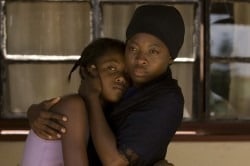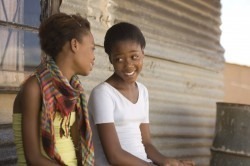
A South African girl experiences the Aids catastrophe in her own family and takes up the fight against silence and repression: the impressive film "Beloved Life" has been showing in German cinemas since yesterday
There are said to be over 800,000 AIDS orphans in South Africa; children and young people who have to struggle through life alone without family and social support. Even though they may not be infected with the virus themselves, they are also victims of this disease, but above all of the many years of taboo, denial and repression, as was the case under the government of President Thabo Mbeki.
Twelve-year-old Chanda will also soon be an orphan. She lives with her younger siblings, her mother and stepfather in a Christian village far from the capital. Her sister, who is barely a year old, has just died, allegedly of influenza. Chanda is sent to organise the coffin. Her mother Lilian (Lerato Mvelase) feels too weak to do so and her stepfather Jonah (Aubrey Poolo) has stolen the money to drink it away with a mistress in a pub.
Breaking the great silence
Oliver Schmitz, unfortunately less known for his apartheid drama "Mapantsula" than for his TV work such as "Doctory's Diary" and "Türkisch für Anfänger", catapults the audience into the everyday reality of the rural township of Elandsdoorn.

Everyone is infected, but nobody would say it
It takes a very long time before Chanda dares to pronounce the diagnosis of "Aids" in the presence of a doctor. Her deceased sister and her mother, her stepfather, who simply disappears for many weeks and reappears emaciated, her best friend, who has to fend for herself and therefore turns to prostitution: they are all infected with the virus, but no one would speak out.
No one dares to face reality. Instead, Chanda's mother is taken out of the village on a pretext so that the family is no longer confronted with "the shame". Aids is seen as a curse, a punishment for a life of sin, but not as a disease that can be avoided or even treated.
Chanda experiences in her own family the terrible consequences of the stigmatisation of the sick, but also how charlatans and doctors linked to pharmaceutical companies smell big business. Bigotry, ignorance and prejudice mean that even people who are close to each other lose compassion and solidarity with one another.

The picture that director Oliver Schmitz, who grew up in Cape Town and works in Germany, paints of South Africa is hardly suitable for glossy tourist postcards. Nevertheless, his film, which is based on the youth book "Chanda's Secret" (German title: "Worüber keiner spricht") by Canadian Allan Stratton, is a far cry from a staid TV drama. Instead, "Beloved Life" is a carefully staged coming-of-age melodrama that portrays the difficult struggle of this courageous girl without falling into the waters of false pity and simplistic emotionality.
Not only an important film, but also a remarkably good one
The fact that the heart-rending scene at the end is not allowed to be missing may be due to certain audience expectations. However, this in no way detracts from the sincere attitude of the film as a whole. The camera and narrative always remain at the girl's eye level and make her the heroine - and not the victim, not even the victim of a Western European point of view. Above all, however, this gives the story the decisive authenticity that is able to touch the viewer and get to the heart of the problems without becoming overly didactic or falling into stereotypes.
This makes "Beloved Life" not only an important film, but also a remarkably good one. The South African Film Association also recognised this and nominated it for the Oscar for the country's "Best Foreign Language Film".
(Axel Schock)
To the premiere report in the DAH blog
"Beloved Life" ("Life, Above All"), Germany/South Africa 2010, Director: Oliver Schmitz, Screenplay: Dennis Foon, Allan Stratton. With Khomotso Manyaka and many others, 106 minutes, cinema release: 12 May 2011
Allan Stratton's novel "Worüber keiner spricht" (translated from English by Heike Brandt), 270 pages, 7.50 euros, is published by DTV-Taschenbuch-Verlag.









